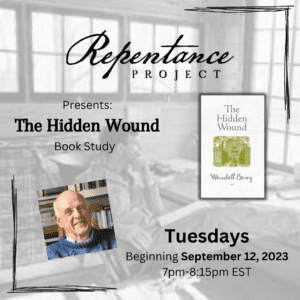“I cannot sit idly by in Atlanta and not be concerned about what happens in Birmingham. Injustice anywhere is a threat to justice everywhere. We are caught in an inescapable network of mutuality, tied in a single garment of destiny. Whatever affects one directly, affects all indirectly.”
– Martin Luther King, Jr., “Letter From Birmingham Jail”
In Genesis, we read the painful story of two brothers. At the height of the story, one has murdered the other, spilling that brother’s blood. The earth drank in this blood and cried out to God in anguish. When God asks about his brother, Cain responds with a contentious question of his own, “Am I my brother’s keeper?” (Genesis 4:9). This question continues to echo through the halls of history, and it showed up indirectly in the books selected for the Repentance Project (RP) 2022-2023 Book Study season.
In the New Testament, Jesus introduces a new perspective on family, “For whoever does God’s will is My brother and My sister and mother” (Mark 3:35). Each person who becomes a follower of Christ is adopted into a new family; we now have brothers and sisters who don’t look like us, don’t speak the same language as us, don’t eat the same foods as us, maybe they don’t even worship in the same ways that we are used to. Nevertheless, they are our family, our “spiritual family”.
 We’re excited to begin a new book study this fall, “The Hidden Wound” by Wendell Berry. During the RP 2022-2023 Book Study season, we sat at the feet of Martin Luther King, Jr., Howard Thurman, and James H. Cone. Each of these theologians address Cain’s question without directly addressing Cain’s question.
We’re excited to begin a new book study this fall, “The Hidden Wound” by Wendell Berry. During the RP 2022-2023 Book Study season, we sat at the feet of Martin Luther King, Jr., Howard Thurman, and James H. Cone. Each of these theologians address Cain’s question without directly addressing Cain’s question.
In his book Why We Can’t Wait, King appeals to his “Fellow Clergymen” through his “Letter From Birmingham Jail”. This letter is a response to a joint letter written by these clergymen where they denounce the efforts of the Civil Rights protests in Birmingham. From a justice perspective, King insists that there can be justice for no one when injustice is allowed to exist for some. Our second book was Jesus and the Disinherited. In this book, Thurman writes about the impact of persistent oppression on the “inner life” of the disinherited follower of Christ. When that persistent oppression comes at the hands of a “brother” or “sister”, it is damaging to the inner life of both the disinherited AND the oppressor. Thurman states that, “American Christianity has betrayed the religion of Jesus almost beyond redemption.” While Thurman offers this strong critique, Cone issues an indictment on the white church in general and white theologians in particular. Our third book in the series was The Cross and the Lynching Tree. The ways in which Cone moved us through some tragic events in US history and introduced us to theological discussions around issues of race made this book very formative for many of us in the book study. In closing, he encouraged us that, “If America has the courage to confront the great sin and ongoing legacy of white supremacy with repentance and reparation there is hope ‘beyond tragedy.’”
Throughout the 2022-2023 book study season, we wrestled collectively and individually with the philosophical implications of Cain’s question, “Am I my brother’s keeper?” We know the answer to Cain’s question is unequivocally YES; however, there is a historical failure in how that “spiritual family” is defined. Yet we know that Jesus said, “For WHOEVER DOES GOD’S WILL is My brother and My sister and mother,” and He did not stutter (as my mom would say).
